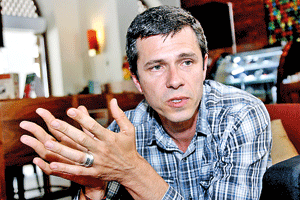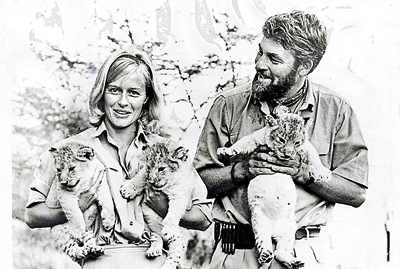Combating wildlife trafficking with “detect and disrupt”

Gabriel Fava: In Colombo as an advocate against illegal wildlife trafficking. Pic by Priyantha Wickramaarachchi
Star tortoises, cockatoos, leopards, pangolins, ‘white gold’ or ivory from elephant tusks, even frozen tiger-cubs and many more have a common but tragic thread woven into a tapestry that seems to cover the whole wide world.
The thread stretches from bio-piracy and bio-prospecting to wildlife trafficking, feeding a multi-billion dollar illegal trade, “big business”, which is pushing several fauna and flora to extinction.
It is to give voice to these grave concerns and urge for harder and joint crackdowns, international cooperation and better enforcement of the law that is already in place that a global expert in the form of the Born Free Foundation’s Associate Director for Asia and Oceania, Gabriel Fava, was in Colombo this week.
A ‘proactive’ stance is what he is crusading for, instead of a ‘reactive’ stance.
Illegal wildlife trafficking is such an obvious thing, it sounds simple, and seems easy to curb but sometimes the authorities may not see a poaching incident’s connections to a wider issue, let alone at a global level even at a national level, was Gabriel’s contention when we met him on Monday.
He delivered the Wildlife and Nature Protection Society’s monthly lecture on Thursday to a full-house at the BMICH’s Cinema Hall and also met many enforcement agencies.
“The frontline people such as the wildlife and police officers may not realize the magnitude of the issue. They may not realize that it is linked to an illegal trade, very similar to crime networks spanning not just countries and oceans but continents as well involved in drugs, arms and people smuggling,” he said, reiterating that wildlife traffickers use many sources of information — open sources, documents et al and are boldly out in the open. They are also ‘patrons’ of the Darknet which is a part of the Deepweb. This is about 500 times the size of the World Wide Web and used for the promotion of illegal goods including wildlife and should be analyzed and monitored.
Categorizing wildlife trafficking within the bigger picture that is ‘transnational crime’, Gabriel is quick to point out that it impacts heavily on national security. Corruption, money laundering and human trafficking…..all are different sides of the same coin and are interconnected to wildlife, both animal and plant, trafficking. “They have an impact on the national economy and a huge impact on the rule of law and governance. So, mitigating these impacts is beneficial to governments.”
He earnestly urged Sri Lanka to use the same sources that traffickers use, as a weapon against them, while maximizing the already effective model encompassing the Police, the Criminal Investigations Department (CID) and the Customs that the country has in place to fight not only crime but also terrorism, while including the Department of Wildlife Conservation (DWC) and any other relevant institution.
The model is to “detect and disrupt” and also prevent, while strengthening collaborations with external international agencies and utilizing the powerful international conventions already in place, says Gabriel lifting into view the well-known Convention on International Trade in Endangered Species (CITES) of Wild Fauna and Flora and two crucial United Nations Conventions – the UN Convention against Transnational Organized Crime (UNCTOC) and the UN Convention against Corruption (UNCAC).
(UNCAC is the only legally-binding universal anti-corruption instrument. Its far-reaching approach and mandatory character make it a unique tool for developing a comprehensive response with regard to law enforcement, asset recovery and international cooperation.)
“Theses conventions allow countries to work on collaborations, without signing memoranda of understanding and delaying crackdowns. There may be resource issues, but these conventions can be invoked immediately and used effectively,” he advocated.
The next CITES meeting is scheduled to be held in Colombo in 2019.
Focusing on INTERPOL (the International Police Organization, an intergovernmental organization facilitating international police cooperation, based in Lyon, France), Gabriel says it has been very proactive. Thereafter, he details Operation COBRA, a fantastic multilateral cooperation and collective effort which mobilized regional enforcement networks and inter-governmental organizations in 62 countries led by INTERPOL under the International Consortium on Combating Wildlife Crime. (An internet search revealed that COBRA which struck effectively in 2013, 2014 and 2015, bridged source, transit and destination countries of wildlife contraband jointly to fight transnational organized wildlife crime. The May 2015 COBRA strike had resulted in 139 arrests and more than 247 seizures including elephant ivory, medicinal plants, rhino horns, pangolins, rosewood, tortoises and many other plant and animal specimens.)
Operation COBRA brought in its wake “huge amounts” of seizures and arrests worldwide. In and on itself, a seizure is only one step, sometimes netting in the small fry, but the information gleaned from these operations is very valuable. Underscoring that it is important to catch the ‘big’ people in wildlife crime, Gabriel said that action should “really hit them where it hurts and should include asset seizure which is a very good measure”. There is a view that national laws are inadequate but the laws are there and what is needed is application of these laws which is not done.
“Corruption is a huge issue. There is no way that wildlife trafficking on this scale would happen without corruption and oiling of palms. Wildlife trafficking has been happening for a long time and they are in fact using lucrative pathways. In terms of usage and money, they are very old pathways that are involved,” he said, seeking a firmer joining of hands and proper implementation of the rule of law.
With Sri Lanka having been on a war-footing for 30 long years, the view is that the country is already armed with a good capacity for intelligence and should not be caught off-guard with regard to wildlife trafficking but “nip it in the bud” to safeguard biodiversity.
| Birth of Born Free Foundation | |
 Born Free starring Virginia McKenna as Joy Adamson and Bill Travers as George Adamson. Courtesy Daily Mail, UK It was an unforgettable movie of the 1960s – the classic wildlife film ‘Born Free’ based on a best-seller by Joy Adamson relating the true story of George and Joy Adamson’s battle to return Elsa the lioness, to the wild. The stars of the movie in addition to Elsa, of course, were Bill Travers and Virginia McKenna who journeyed all the way from Britain to Kenya for the ‘shooting’. Inter-acting closely with lions would change their lives, triggering a passion to ensure that wild creatures belong in the wild. This led to the birth of the Born Free Foundation in 1984 and Gabriel who has been with this charity since 2009 has worked with Virginia. Bill is no more. “She is very active even though now she has stepped down as the President, handing over the reins to her son, Will,” says Gabriel. Starting off with the ‘mission’ of preventing individual animal suffering and keeping wildlife in the wild and rescue and care of animals in trouble, the Born Free Foundation has gradually moved into conservation and education as its main tasks. Gabriel had been propelled towards wildlife conservation after living on “barren” Malta, located in the Mediterranean between Sicily and North Africa, experiencing first-hand an island without any wildlife. Born in the United Kingdom (UK), he had moved to Malta, at the tender age of 6, as his father was from there. A colonial target, the island had been stripped of its wildlife, a trend which continued even after. “Everyone took what they wanted,” he says wryly, adding how beautiful migratory birds, small or big, were also shot down. Where earlier there had been pangolin and more “native fauna”, there is now only “introduced species” such as chameleon and just dogs and cats. “Lack of exposure made me see the value of wildlife,” says Gabriel who yearned for proper eco-systems. Going back to the UK when he was 18, he got into the line of ecology, securing a degree there. Joining Born Free Foundation in 2009, and working in the UK for a while, he now lives in Australia with his wife and two children. In Sri Lanka, Born Free Foundation, currently headed by Manori Gunawardena, has been supporting the Department of Wildlife Conservation (DWC) since 2002 in running Ath Athuru Sevana, the Elephant Transit Home at the Uda Walawe National Park which cares for orphaned babies and then releases them back to the wild. It also works in tandem with the DWC to mitigate the human-elephant conflict (HEC) and curb wildlife crime. With regard to his work in the region, Gabriel turns the spotlight on the Tiger Rescue Facility run by the Born Free Foundation and ensconced within Karnataka’s Bannerghatta National Park in India. A tiger released from the captivity of a zoo in Barcelona has found a ‘home’ here amidst an enclosed wilderness as also three ‘conflict’ tigers which have been preying on humans and cattle in the area. “We believe these are the first captive tigers in India which have 24-hour access to the outdoors in a natural forested habitat,” says Gabriel. Another animal which seems to be tugging very hard at his heart-strings is the cryptic pangolin, with its armoured shell and peculiar gait, the “most trafficked mammal” in the world. Pointing out that this slow-breeding creature is “very sensitive” and often dies in captivity, he laments that they were “suctioned off” from Southeast and East Asia and no one really caught on to this trend early in the day and very few of them are left. Now the illegal trafficking of pangolins has shifted gear and moved to Africa. “There have been four pangolin cases last year in Sri Lanka, all being taken to Chennai, in South India which seems to be a hotbed for this illegal trade,” chips in Manori, with Gabriel adding that every year over 100,000 pangolins who are ‘threatened with extinction’ are captured from the wild in Asia and Africa illegally and killed for their meat and scales. The impact on the eco-system of such a massacre of this termite-eating creature would be devastating. “You can have all the laws in place. But there remains a demand that draws in the victims,” says Gabriel, calling for an end to that demand which is the swansong for pangolins. |


